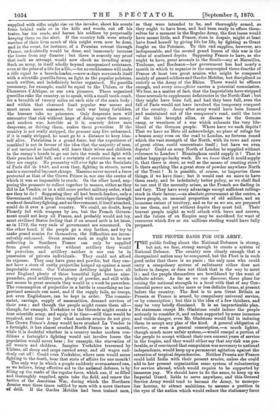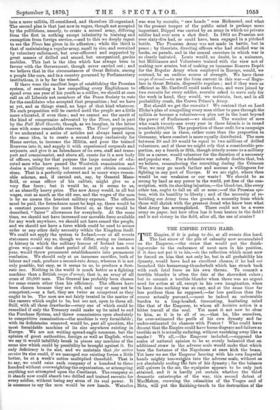THE PROPER BASIS FOR OUR A RNIY. T HE public feeling
about the National Defences is strong, but not, we fear, strong enough to create a system of National Defence. The country sees clearly enough that a. disorganized nation may be conquered, but the Fleet is in such good order that there is no panic ; the only man who could carry a compulsory system of enlistment either does not believe in danger, or does not think that is the way to meet it ; and the people themselves are bewildered by the want of definite advice. As far as we can discover, three plans for- raising the national strength to a level with that of any Con-. tinental power are, under more or less definite forms, at present- before the country. The first is to arm Great Britain as Prussia or France is armed, by compulsory universal service, or by conscription ; but this is the idea of a few thinkers, and may be very briefly dismissed. It is an impracticable plan. No statesman except Mr. Gladstone could induce the people. seriously to consider it, and unless supported by some immense- and visible danger, even Mr. Gladstone would fail in inducing them to accept any plan of the kind. A general obligation of service, or even a general conscription,—a much lighter, though much more unfair system,--would compel a portion of the people to accept without their own consent years of service- in the tropics, and they would either say that any risk was pre- ferable, or if convinced that compulsion was necessary to national independence, would keep up a permanent agitation against the- retention of tropical dependencies. Neither Prussia nor Franca could hold India with their present armies, unless she could add to her present organization some system of volunteering for service abroad, which would require to be supported by immense pay. We should have to do the same, to keep up an Imperial Guard, liable to serve anywhere, and this-General Service Army would tend to become the Army, to monopo- lize honour, to attract ambitions, to assume a position in the eyes of the nation which would reduce the stationary force into a mere militia, ill-considered, and therefore ill-organized. The second plan is that just now in vogue, though not accepted by the politicians, namely, to create a second army, differing from the first in nothing except inferiority in training and exemption from foreign service,—and to this we deeply regret to see the Times has given in its adhesion ; while the third is that of maintaining a regular army, small in size, and recruited by voluntary enlistment, but over-officered and supported by great masses of drilled and armed, but unorganized, gardes mobiles. This last is the idea which has always been in favour with the Government, though never carried out ; and we believe that in the circumstances of Great Britain, among a people like ours, and in a country governed by Parliamentary institutions, it is by far the wisest. If there were the smallest hope of establishing the Prussian system, of enacting a law compelling every Englishman to spend even one year of his youth as a soldier, we should at once call on all Liberals not members of the Peace Society to vote for the candidates who accepted that proposition ; but we have as yet, and as things stand, no hope of that kind whatever. No such proposition will be carried until the people are a little more educated, if even then ; and we cannot see the merit of the kind of compromise advocated by the Times, and in part by the Pall Mall Gazette, though, as we imagine, in the latter case with some remarkable reserves. The Times' proposition, if we understand a series of articles not always based upon the same idea, is to create a second Army exclusively for Home service, to increase the Militia, and pour the trained Reserves into it, and supply it with experienced corporals and serjeants, and give it an Intendance of its own, staff and trans- port and commissariat, and above all, create for it a new body of officers, using for that purpose the large number of edu- cated men who have passed the Woolwich examination and desire a military career, but cannot as yet obtain commis- sions. That is a perfectly coherent and in many ways reason- able scheme, and, if carried out, say, by General Mans- field, or some officer of his calibre, might give us a very 'fine -force ; but it would be, as it seems to us, at an absurdly heavy price. The new Army would, in all but wages, cost as much as the old one, and the wages of the men is by no means the heaviest military expense. The officers must be paid, the Intendance must be kept up, there would be a constant pressure for more liberal or, as they would be described, " fairer " allowances for everybody. At the same time, we should not have increased our movable force available for any work anywhere, we should not have armed the people, and we should not have a force which could be used to secure order or any other daily necessity within the Kingdom itself. We could not apply the system to Ireland,—or at all events statesmen would say so, though we differ, seeing no instance in history in which the military honour of Ireland has ever given way,—and the short period of drill, only a month a year, would throw permanent establishments into permanent confusion. We should only at an immense sacrifice, both of labour and cash, produce a second-rate Army, whereas it is not only possible, but easy, as it seems to us, to produce a first- rate one. Nothing in the world is much better as a fighting machine than a British corps d'arme'e, that is, an army of all arms of 30,000 men. The General has probably been chosen for some reason other than his efficiency. The officers have been chosen because they are rich, and may or may not be competent,—as a fact, they are twice as competent as they ought to be. The men are not fairly treated in the matter of the careers which ought to be, but are not, open to them all. Still, with all these drawbacks—every one of which could be remedied if only the Treasury could make up its mind to end the Purchase System, and throw commissions open absolutely to competitive examination—the machine is very formidable ; with its deficiencies removed, would be, past all question, the most formidable machine of its size anywhere existing in Europe. We are not writing spread-eagle nonsense, but the opinion of great authorities, foreign as well as English, when we say it would infallibly break in pieces any machine of the same size which could by possibility be brought against it. Its only deficiency is its size, and we maintain that for active service its size could, if we managed our existing forces a little better, be at a week's notice multiplied threefold. That is to say, we could raise each company of a hundred to three hundred Without overweighting the organization, or attempting anything not attempted upon the Continent. The company as it stands now could absorb two drilled and trained recruits for every soldier, without losing any atom of its real power. It is nonsense to say the men would be raw hands. Waterloo was won by recruits, " raw hands " won Richmond, and what in the present temper of the public mind is perhaps more important, Duppel was carried by an army in which no private soldier had ever seen a shot fired. In 1864 no Prussian not over sixty-five had, or could have, been engaged in a pitched battle. The Prussian Army was not made in battle, but in peace ; by theorists, directing officers who had studied war in books, on parade, and in the annual exercises in whioh war is so closely imitated. Louts would, no doubt, be a nuisance, but Militiamen and Volunteers trained with the view not of making new armies, but of making an immense Reserve Depot for the Regular Army when employed in Europe, would, we contend, be an endless source of strength. We have three corps d'arme'e—to use the form current in this war—of Regu- lars in Great Britain, disposable regulars ; and if they were as efficient as Mr. Cardwell could make them, and were joined by two recruits for every soldier, recruits asked to serve only for the work in hand, they would, we maintain, face, and in all probability crush, the Crown Prince's Army.
But should we get the recruits ? We contend that on Lord. Echo's plan of compelling every man either to pass through the militia or become a volunteer—a plan not in the least beyond the power of Parliament—we should. The number of men who reach twenty-one every year in these Islands is in round numbers 300,000. The proportion of these unfit fora campaign is probably one in three, rather more than the proportion in Germany, where comfort is more equally distributed. The men between 20 and 30 would be equal to two millions of drilled volunteers, and of these we might rely that a considerable pro- portion, say a fourth or fifth, though utterly averse to a military life as a career, would volunteer for the duration of a necessary and popular war. For a defensive war nobody doubts that, but we believe, remembering the recruiting during the Crimean War, we may go much farther and assume a willingness for fighting in any part of Europe. If we are right, where then would be our weakness or our waste ? We should be as strong by land as any power in the world, yet free of the con- scription, with its shocking injustice,—the blood-tax, like every other tax, ought to fall on all or none ;—of the Prussian sys- tem, with its hostility to liberty ; and of the necessity of re- building our Army from the ground, a necessity from which those will shrink with the greatest dread who know best what that Army has accomplished. There could not be a worse army on paper, but how often has it been beaten in the field I and is not victory in the field, after all, the use of armies?































 Previous page
Previous page